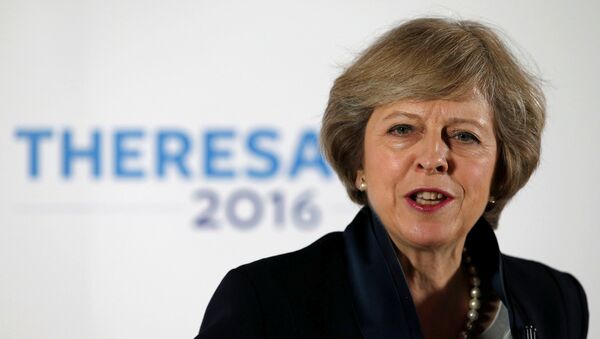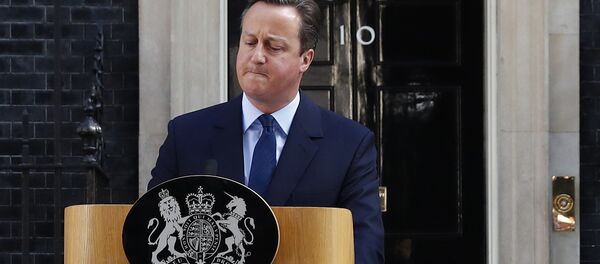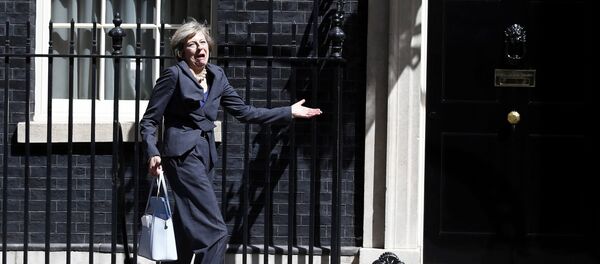Brexit campaigners ex-Mayor of London Boris Johnson and ex-head of Ukip Nigel Farage, as well as outgoing PM David Cameron, who opposed Brexit, have all withdrawn from major decision-making.
However, the New Tories' announcement of May leading the cabinet revived hopes that massive Thatcher-style economic reform would put the economy back on track and address the challenges posed by the separation with mainland Europe.
Exciting to be there to hear @TheresaMay2016 declared new Party leader. Challenges & opportunities ahead — but she's the woman for the job.
— Jane Ellison MP (@JaneEllison) 11 July 2016
The UK's Home Secretary Theresa May, 59, will head HM's Government effective Wednesday, succeeding David Cameron and leading the nation through the muddy waters of Brexit into a new economic reality, allegedly based on a surplus in its international trade balance sheet, fiscal stimulus and the non-financial private sector incentive. The Conservative Party (also known as the New Tories) picked May over other claimants based on hers hardline approach to decision-making.
"She's strong, she's competent, she's more than able to provide the leadership our country will need in the years ahead," Cameron said in a statement.
Earlier this year, May favored the UK remaining in the EU, even though she has been described as significantly more conservative, isolationist and tougher on immigration than prominent "Out" campaigners, such as Boris Johnson.
Portrayed in the media as a right-wing, free market conservative, May has been described as an English rendition of Angela Merkel, the Chancellor of Germany. Her personality was referred to as that of a "a bloody difficult woman" by Kenneth Clarke, one of the prominent figures in the New Tory camp.
Great to see a strong woman like @TheresaMay2016 leading the @Conservatives during this transformative time for Britain-JG
— Julia Gillard (@JuliaGillard) 12 July 2016
"Brexit means Brexit, and we're going to make a success of it," May said on national television on Monday. "We need a strong new positive vision for the future of the country, a vision that works not for the privileged few but for every one of us, because we're going to give people more control over their lives, and that's how together we will build a better Britain."
Boris Johnson endorsed the May candidacy for PM, having said that she "has the authority & the leadership necessary to unite the Conservative Party & the country."
3/3 I’ve no doubt Theresa will make an excellent Prime Minister and I'm encouraged that she's made it clear that Brexit means Brexit.
— Boris Johnson (@BorisJohnson) 11 July 2016
Meanwhile, in the Ukip camp, which represents a wide variety of stiff right-wing pro-Brexit "little England" voters, May's appointment to the PM post stirred a fair amount of concern. She would be "the death of Brexit, by a thousand cuts" and abandon the results of the referendum, said millionaire businessman Arron Banks, one of Ukip's biggest donors.
'Together, we will build a better Britain' — watch Theresa's speech after being chosen as @Conservatives leader: pic.twitter.com/MIUIqRVSoM
— Theresa May (@TheresaMay2016) 11 July 2016
After May's appointment, the UK's stocks rallied 1.4 percent on Monday, entering bull market territory as evidenced by FTSE 100 dynamics. The index is now up 21 percent compared to its February low. Investors are now seeing Brexit as an opportunity rather than a concern. May has already announced the government would abandon its planning to meet its budget surplus target by 2020, meaning greater budget spending aimed at spurring economic growth.
"The markets are likely to be more positive on Theresa May, as much for the greater political calm that her victory should engender," Donal Kinsella of London-based Henderson Global Investors said.
"There is an irrational, unhealthy and growing gap between what these companies pay their workers and what they pay their bosses," May said. "Yes, we're the Conservative Party, and yes we're the party of enterprise, but that does not mean we should be prepared to accept that anything goes."
Following May's speech, British sterling leapt to $1.30 from just $1.2858 several hours prior, thus supporting the view that the soon-to-be Prime Minister's selection has re-assured the fate of the UK's economy in the eyes of investors, the real sector and import/export enterprises alike. Her economic reform plans are expected to be announced soon after her formal induction into office on Wednesday.






